- Home
- Robert Goddard
The Ways of the World Page 30
The Ways of the World Read online
Page 30
‘How soon will you be fit enough to travel?’
‘I’ll go on tonight’s sleeper.’
‘Being shaken around on that won’t do you much good. And then there’s the Channel crossing.’
‘Is there a storm forecast?’
‘Not that I know of.’
‘Then don’t worry about me. I only need you to do a couple of things for me.’
‘What?’
‘Get me the gun you promised before I leave.’
‘I didn’t promise anything.’
Max gave Appleby a straight look. ‘Just get it, OK?’
Appleby sighed. ‘Very well.’
‘And can you organize the ticket?’
‘All right. But you’ll be on your own, you know. In every sense of the word.’
‘Oh, I know. But that doesn’t matter. Actually, it’s how I prefer it.’
Max had a meal sent up to him and planned to take a nap afterwards, before going to the Majestic to speak to Sam. In the event, he plunged into a deep sleep and was woken by Sam coming to see him at the end of his working day. It was already early evening. Anxious as he was to set off, time was slipping through his fingers like sand.
‘You should still be in the hospital, sir,’ Sam said, frowning at Max with obvious concern. ‘Mr Appleby said you were off to London tonight. You never are, are you?’
‘Needs must, Sam.’
‘You’re going after Brigham?’
‘Someone has to.’
‘But you’re not well enough. It’s plain to see.’
Max strode less than fluidly across to the dressing-table and peered at himself in the mirror. ‘A little pale, I grant you. A steak supper will see me right. Care to join me?’
‘More than happy to, sir. But there’s something I have to tell you first.’
‘Appleby filled me in on everything, Sam. You did well and I’m very grateful. Finding Bukayev as you did can’t have been pleasant. You can tell me all about it over a stiff drink.’
‘This is something Mr Appleby doesn’t know about, sir.’
‘It is?’
‘And in the circumstances … I don’t think it’ll wait.’
AS THEY LEFT the Mazarin, the reception clerk presented Max with a letter that had been handed in for him. The envelope contained his ticket for the sleeper to London and a note from Appleby. I will meet you with the other at the station tonight.
‘What’s the “other”, sir?’ Sam asked, craning over his shoulder as they exited on to the street.
‘A bath-chair, I expect. Everyone’s convinced I’m an invalid.’ Max suspected Sam would worry about him all the more if he knew he was going to be carrying a gun.
‘But you are an invalid, sir, that’s the trouble. Maybe I ought to go with you.’
‘And walk out on your new job? I wouldn’t hear of it. I’ll see my doctor when I get to London. He can do any patching-up that’s needed.’
‘You’ll have a relapse if you overdo it.’
‘I’m not letting Brigham off the hook, Sam. You may as well accept it. Now, find us a cab, there’s a good fellow. Ordinarily, I’d walk to the Plaza Athénée, but as it is …’
‘I’ll find one, sir. You just stay there.’
Baltazar Ribeiro was dressing for dinner when they were admitted to his suite at the Plaza Athénée. His delight at seeing Max up and about was considerable, although it was swiftly followed by concern. ‘Sit, sit,’ he said, ushering Max to a couch.
‘Before he falls down, eh, senhor?’ said Sam. ‘I have tried to tell him.’
‘And as I’ve already told Sam, I can’t afford to rest. I’ve lost enough time lying in that hospital already.’
‘Drink a little brandy,’ said Ribeiro, fumbling with a bottle and some glasses. ‘It gives strength when you need it.’
Max did not argue and accepted a tot. ‘I expect you can guess why we’re here, Baltazar,’ he said, swallowing some down.
‘Of course. I meant what I said to Mr Twentyman yesterday. It is time to share the secret with you, Max, and I am glad to have the chance – glad because you are well enough to be told.’ Ribeiro drew up a couple of armchairs, one for himself, one for Sam, and sat down. He drank some of his brandy and gazed earnestly at Max. ‘Henry was my friend. I did not feel I could tell you this when we first met because he had trusted me to tell no one. But so much has happened since then that I think now you should know. Still, it is not easy. I feel I am … betraying him.’
‘I understand,’ said Max. ‘But if this information helps me bring his murderers to justice …’
‘I do not see how it can do that. But at least you will know what was in his mind. In truth, it is a simple story. O amor. Love. He was planning a future for himself and Corinne Dombreux. He was not a rich man. His wealth was in the estate in England. He needed money of his own to give them a comfortable life somewhere. And I … suggested a way to get it.’ Ribeiro frowned at his own folly – or that of Sir Henry. ‘I inherited land in Amazonas from my elder brother, Francisco, land that had once made our family rich from the rubber it produced. But the business went into decline around the turn of the century because of competition from Asian plantations. Now the land is nothing except jungle. An Englishman is to blame for this, I must tell you. A man called Wickham smuggled thousands of rubber seeds out of Brazil that were used to start growing the crop in Malaya. Our monopoly was broken. Our rubber trees grow wild, you must understand. We did not plant them. We could not compete with the close-grown Asian plantations. The riches … evaporated.’
‘Baltazar, I don’t quite—’
‘Wait, wait. I will explain. Francisco had a plan. He believed plantation rubber could be successfully grown in Brazil. It only required labour to clear the land and expert knowledge of how to cultivate the crop. He bought options on several neighbouring estates and sent a trusted man to Malaya to study how it was done. Then he died. And the war came. But the options stand. I inherited them from him. I have had discussions with representatives of two large American corporations who are interested in investing in Francisco’s scheme. Motor cars are the transport of the future, Max. One day everyone will want to own one. And every car has four tyres made of rubber. This could make me rich again many times over. It could have made Henry rich too. If he had lived.’
‘You persuaded him to put some money into this venture?’
‘I offered him the opportunity, as a friend. Firestone and Ford – there now, I have told you who the American corporations are – do not want the price of rubber to be set by Britain, France and the Netherlands, the imperial powers who control the rubber-growing areas of south-east Asia. They fear a cartel, with the price going up and up. A separate source of rubber, in Brazil, controlled by them, appeals to them greatly. They will pay handsomely to secure it. But I must take up the options if I am to be the one they pay. And for that I need liquid cash. I have some, of course. But not enough. I asked Henry if he would like to be my partner. He said yes. And he said he thought he could raise the rest of the cash we would need. I did not ask how. But I swear to you I did not think he meant to risk his life to do it.’
Max contemplated the irony of his father’s fate. His relationship with Corinne was a late-life chance of happiness. Naturally, he wanted to give her all the luxuries she had been denied in recent times. Then Ribeiro came to him with a proposition that must have seemed heaven-sent. All he needed was his share of the investment. And so he turned his mind to such assets as he could trade in. It was a short list – and, as it turned out, a dangerous one. ‘Where did he plan to take Corinne, Baltazar?’
‘He did not say. Rio, maybe. He loved the city and would have enjoyed introducing her to it. With his share of the profit, he could have bought a grand mansion in Botafogo and a villa in Petrópolis to retreat to in the summer and a private art collection and a racehorse and more fine clothes and jewellery than Madame Dombreux could ever have worn.’
‘Is this really rubber you�
��re talking about – or gold?’
‘Rubber is gold to Henry Ford and Harvey Firestone, Max. They will pay whatever I ask.’
‘Will you still go through with it?’
‘If I can raise the money to buy the options, yes, I suppose I will. But I must be honest with you. There is profit and there is joy. They are not the same. Money is paper and the possessions you buy with it. Joy is in the spirit. And there is no joy for me in this now Henry is dead. Especially if I believe, as it seems I must, that he died because of my accursed scheme to make us both rich.’
‘You shouldn’t blame yourself. I’m sure my father wouldn’t want you to.’
‘No. He would not. He was a good man.’
‘About Ennis, Baltazar …’
‘Sim?’
‘Sam tells me Ennis mentioned “contingencies”.’
‘Ah yes. He did. I do not know what he meant.’
‘Does the phrase “Contingencies Memorandum” mean anything to you?’
Ribeiro shook his head. ‘No. A document maybe. Something to do with the conference.’
‘Something my father saw as a source of money, actually. But what exactly it was … or is …’
‘I did not know he carried so many secrets. They did not weigh him down. I will say that. The last time I saw him, his heart was light.’
‘Did he ever mention a man called Fritz Lemmer to you?’
‘Lemmer?’ Ribeiro frowned. ‘Yes. I think he did. Not recently, though. Years ago, when we first knew each other, in Rio.’
‘What did he say?’
‘Meu Deus! It is so long ago. But I do remember the name. Yes, Lemmer. What was it? What was it Henry used to say?’ Ribeiro stroked his moustache as he cast his mind back. ‘Somehow, I think, he was involved with an assassination attempt against the Tsarevich in Japan. Yes. Japan. That is where Henry knew Lemmer. You know him also?’
‘I’m beginning to. He’s a dangerous man. As Pa discovered.’
‘I am sorry I did not tell you the whole truth when you first came to see me.’
‘It wouldn’t have made any difference, Baltazar. It wasn’t your rubber venture that got my father killed. It’s what he did to fund it.’
‘Rio has the most beautiful racecourse in the world, you know, with the mountains and the bay and the clear, clear light.’ Ribeiro shook his head in mourning for times past. ‘Such days we had there, Henry and I.’ He sighed. ‘He always liked long odds. It was a weakness of his. I believe you may have inherited it.’
‘You could be right.’ Max rose slowly to his feet, gratified by the lack of pain in his side. ‘I certainly wouldn’t suggest you back me to win.’
‘But you will run the course, even so?’
Max nodded. ‘Oh yes. To the end.’
IN THE END, Max had his steak at the Gare du Nord. He was tired, but oddly exhilarated. Lemmer had got the better of him so far, it was true, but Brigham was vulnerable for reasons Lemmer was almost certainly unaware of and Max was confident he could exploit the fact.
He asked Sam to tell Nadia where he was going and why. He had hoped to see her that evening, but the visit to Ribeiro had eaten into his reserves of time and energy. He also asked Sam to apologize to Mellish on his behalf for giving him no warning of his departure. Sam reiterated his opinion that a man in Max’s condition should be going nowhere except the nearest hospital. But he knew Max was not going to change his mind. ‘You are a stubborn so-and-so, sir, you truly are.’
Appleby arrived to see Max off with barely ten minutes to spare before the train left. Max had begun to suspect he was not going to be supplied with the promised gun, but Appleby had actually been delayed by a wrangle with Carver. ‘It may be just as well you left the Hôtel Dieu when you did. He was hoping to interrogate you. Naturally, I claimed ignorance of where you’d gone.’
The revolver came with a box of ammunition. ‘As far as anyone’s to know,’ Appleby emphasized, ‘you bought this from an ex-serviceman in a bar.’
‘I’ll remember that.’
‘What kind of marksman are you?’
‘I wasn’t bad with a machine-gun mounted on a Sopwith Camel.’
‘Have you ever fired a revolver?’
‘No. But don’t worry. The other chap won’t know that.’
He boarded the train with Sam, who stowed his bag in the first-class sleeping compartment Appleby had generously paid for. They shook hands before Sam got off. No words were spoken. They had said all that needed to be said. Max lit a cigarette, his first since the shooting, and waved from the window as jauntily as he could manage when the train drew out. Appleby had already left. Only Sam remained to wave back.
Max surprised himself by sleeping well as the train wound north through the night. A pink-streaked dawn was breaking as the ferry left Calais. His Channel crossing with Ashley seemed an age ago, though in fact only a week had passed since then. Time, as he knew from the contrast between active service and confinement as a POW, was a deceptively elastic commodity.
It was mid-morning when the train reached Victoria. Max felt sore and weary, despite all the sleep he had had. He made straight for the flat. Tuesday was not one of Mrs Harrison’s cleaning days, so he was safe from mothering by her. A shivering fit on the ferry had subsided as rapidly as it had come and his wound seemed to be healing well. He was still several paces slower, in thought and movement, than he was used to being. He was not quite as firmly fixed in the world as he knew he should be. It was as if he was slightly drunk when in reality he was stone-cold sober – and deadly serious.
After a soothing bath and a closer shave than he could have managed on the train, he telephoned the Foreign Office. He was put through to Brigham’s secretary. She was all plummy-toned unhelpfulness at first, but, after consulting Brigham at Max’s insistence, she changed her tune. ‘I’ll put you through, Mr Maxted.’
‘James?’ Brigham sounded suspicious, as well he might, but also strangely solicitous. ‘I’m glad to hear from you. How are you? I’ve been worried about you.’
‘You know about the shooting?’
‘Yes. I’d have come to see you if I hadn’t been, well, banished in effect, as a result of an absurd misunderstanding. Are you phoning from the hospital? It’s an unusually good line.’
‘No. I’m in London.’
‘What? How’s that?’
‘I discharged myself. It wasn’t a serious wound. I feel fine.’
‘Really?’
‘Really.’
‘But what brings you to London?’
‘You do, Brigham. I’ve been thinking about what you said when we met in Paris. I shouldn’t have flown off the handle as I did.’
‘Well, it’s understandable that—’
‘The fact is, I think I may have misjudged you.’
‘You do?’
‘It’s an awkward situation. I’m sure you appreciate that.’
‘Of course.’
‘I wonder if we could meet and talk things through a little more calmly.’
‘I’d be delighted to, my boy. When can you manage? How about lunch at my club? My unexpected return to London means I have an empty diary.’
‘Lunch at your club would suit me very well.’
‘Then I’ll see you at the Athenaeum at one.’
Max donned an artificial persona as well as one of his better suits for lunch with Brigham. He would be reasonable, open-minded and receptive. He would imply that his brush with death had made him appreciate how justified – and genuine – Brigham’s concern for his welfare was. As to their possible blood relationship, he would suggest it was a question they could never hope to answer conclusively; it might best be left open. They were men of the world. Not all marriages were happy. Not all adulteries were contemptible. Oh, yes, Max intended to be everything he needed to be to set Brigham at ease.
The ploy was remarkably successful. Brigham greeted him in the entrance hall of the Athenaeum warmly, if nervously. ‘We got off on the wrong foot la
st time, James. I can’t tell you how pleased I am to have this chance of setting matters right.’
They went into the dining-room and sat at a window table. Brigham was well-known to the staff and other members. He was in his element, which was exactly where Max wanted him. Max ventured an apology for his behaviour when they had last met. Brigham assured him it was unnecessary. They relaxed over aperitifs. Brigham referred again to the ‘misunderstanding’ that had led to his departure from Paris. Max did not oblige him to elaborate.
Wine began to flow, though Max made sure more of it flowed down Brigham’s throat than his. He recounted his war experiences. Brigham described the life of a diplomat. They both expended a deal of delicacy in discussing Brigham’s friendship with Max’s mother, while refraining from specifying what it might mean they were to each other. Neither of them mentioned Walter Ennis or Igor Bukayev. Neither spoke directly of the circumstances of Sir Henry’s death.
Late in the meal, Max shifted the ground of their conversation, as he had always intended to. ‘I think I may have threatened to kill you when we spoke that night in Paris, Brigham.’
‘I trust you’re not planning to now.’ Brigham’s voice was slightly slurred, his face flushed, but not with anger. He was, in fact, smiling broadly.
‘No. My narrow escape at Notre-Dame has made me realize how foolishly I was behaving then.’
‘I did warn you.’
‘Indeed you did. I should have listened.’
‘Paris may not look like a snake-pit, but that’s what it is while this damned conference brings half the world’s rogues to its boulevards. You were lucky not to be killed.’
‘I know. Blundering around the city accusing every third person I met of involvement in Pa’s murder wasn’t the wisest way to proceed.’
‘Probably not.’
‘I’ve made myself a few enemies in the process.’
‘Just as well you’ve left Paris, then.’
‘Yes. But some of them have a long reach, I fear. One in particular.’ Max lowered his voice and leant across the table. ‘Fritz Lemmer.’

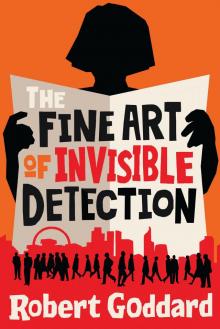 The Fine Art of Invisible Detection
The Fine Art of Invisible Detection One False Move
One False Move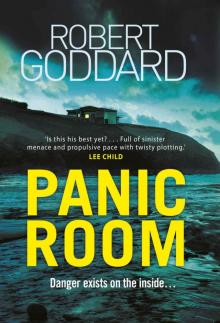 Panic Room
Panic Room Beyond Recall
Beyond Recall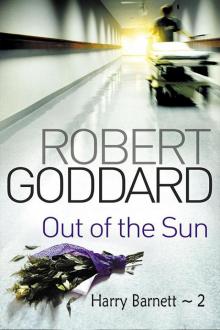 Out of the Sun
Out of the Sun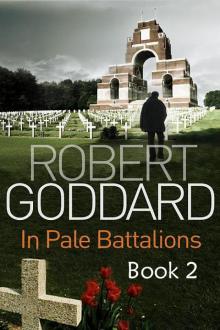 In Pale Battalions - Retail
In Pale Battalions - Retail Painting The Darkness - Retail
Painting The Darkness - Retail The Corners of the Globe
The Corners of the Globe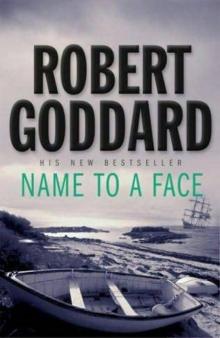 Name To a Face
Name To a Face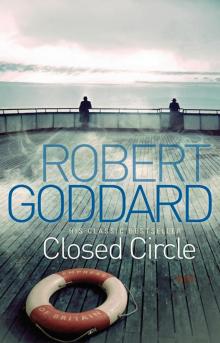 Closed Circle
Closed Circle Caught In the Light
Caught In the Light Into the Blue
Into the Blue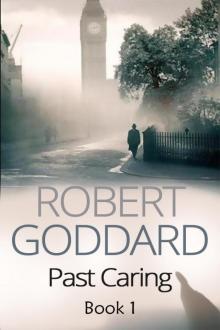 Past Caring - Retail
Past Caring - Retail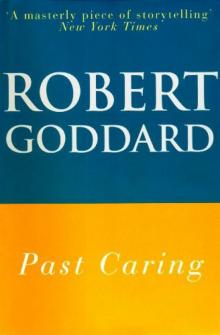 Past Caring
Past Caring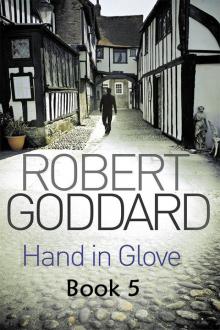 Hand In Glove - Retail
Hand In Glove - Retail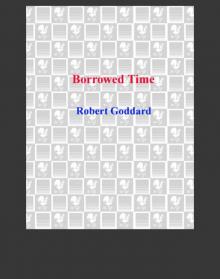 Borrowed Time
Borrowed Time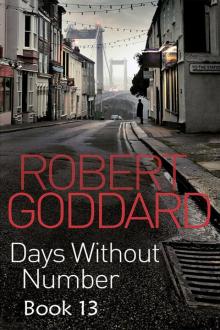 Days Without Number
Days Without Number James Maxted 03 The Ends of the Earth
James Maxted 03 The Ends of the Earth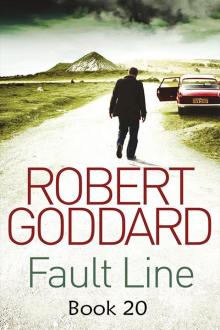 Fault Line - Retail
Fault Line - Retail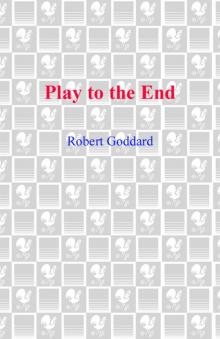 Play to the End
Play to the End Sea Change
Sea Change Never Go Back
Never Go Back Take No Farewell - Retail
Take No Farewell - Retail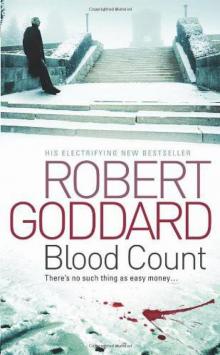 Blood Count
Blood Count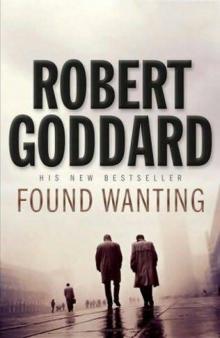 Found Wanting
Found Wanting Sight Unseen
Sight Unseen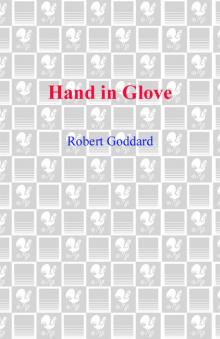 Hand in Glove
Hand in Glove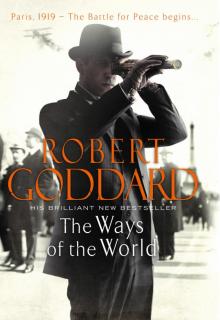 The Ways of the World
The Ways of the World